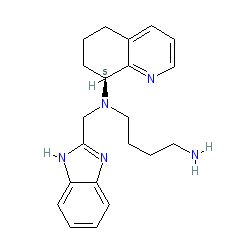GtoPdb is requesting financial support from commercial users. Please see our sustainability page for more information.
|
Synonyms: AMD 070 | AMD-070 | AMD-11070 | AMD11070 | compound 2 [PMID: 20297846] | X4P-001 | X4P-001-IO | X4P-001-LD | Xolremdi®
mavorixafor is an approved drug (FDA (2024))
Compound class:
Synthetic organic
Comment: Mavorixafor (AMD070/AMD11070) is a potent, selective and bioavailable CXCR4 chemokine receptor allosteric antagonist [5]. Originally developed for HIV treatment [4], it was repurposed by X4 Pharmaceuticals as X4P-001 for the treatment of WHIM syndrome, a sub-type of a primary immunodeficiency disease caused by CXCR4 mutations. The compound is exemplified in a process patent US7332605 and as compound 89 from a series of 169 analogues in WO2003055876 but neither filing includes activity data.
Ligand Activity Visualisation ChartsThese are box plot that provide a unique visualisation, summarising all the activity data for a ligand taken from ChEMBL and GtoPdb across multiple targets and species. Click on a plot to see the median, interquartile range, low and high data points. A value of zero indicates that no data are available. A separate chart is created for each target, and where possible the algorithm tries to merge ChEMBL and GtoPdb targets by matching them on name and UniProt accession, for each available species. However, please note that inconsistency in naming of targets may lead to data for the same target being reported across multiple charts. ✖ |
|
|||||||||||||||||||||||||||||||||||
| Immunopharmacology Comments |
| X4 Pharmaceuticals announced (press release Jan 2017 ) a Phase 2/3 of X4P-001-LD, a low dose formulation of mavorixafor, as a chronic treatment for patients with WHIM syndrome. This is a genetic primary immunodeficiency disease caused by the aberrant trafficking of specific immune cells that are critical for proper immune system function which is caused by mutations in the CXCR4 receptor |
| Immunopharmacology Disease | |||
| Disease | X-Refs | Comment | References |
| WHIM syndrome |
OMIM:
193670 Orphanet: ORPHA51636 |
Phase 3 clinical candidate for WHIM syndrome. FDA Breakthrough Therapy Designation for this indication was granted in November 2019. | |








